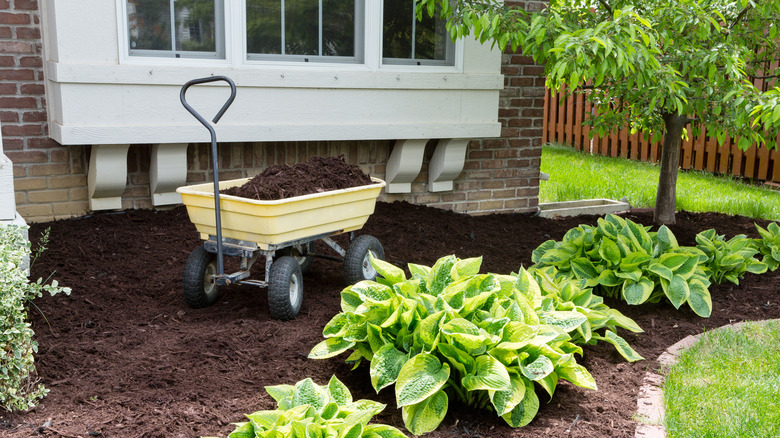A new layer of mulch in your flowerbeds around your home can create a stunning look to the space, a refreshed, clean foundation for the blooming flowers and bushes within it. Mulch, which is typically made of shreds of wood, can be a safe choice for most environments, but putting it too close to the house could encourage some pests, specifically wood-eating termites.
The key concern is luring termites close to the home. Once there, they may find a small hole or area to infiltrate the structure, where they will feast on the wood structure, creating a sizable colony that puts the structural integrity of your home at risk. Over time, these small pests can eat into many wooden beams and panels until they create so much damage that weakness forms.
Termites are a dangerous pest when it comes to the structural integrity of a home. With around 600,000 U.S. homes suffering termite-related damage annually, at the cost of about $5 billion in repairs each year, according to data from Orkin, this is a problem you don’t want to have. There are some limited risks of using mulch around homes that could increase the desirability of the space for termites, but there are also a few steps you can take to minimize this risk. That way, you can avoid getting rid of termites by preventing them.
Why termites and mulch go hand-in-hand

You may know that termites eat wood, and since mulch is wood-based, they are naturally drawn to it. There’s more to it, though. One of the reasons to use mulch in flowerbeds is to help with water retention, the process of preventing water from simply running away after a rain shower. Termites love that moist environment, though, and that encourages them to move into spaces with a good food source, the proper climate, and ample moisture. However, drywood termites actually prefer dryer material, so even a very dry area isn’t protected from termites.
However, there are limitations to the risk of infestation. First, termites need access to high-quality wood to build a strong colony, and without access to a colony, termites don’t survive long. If you were to put mulch into your garden, they aren’t close enough to the structure of a home to cause a problem, and most often, termites won’t thrive there. If you place the mulch close to the edge of your home, and there are wood beams present, or you have wood siding, that’s going to be more attractive to these pests, and they may try to move into the home. You can place mulch right up against your home if you have a cinder block, brick, or cement exterior since this will block the termites from entering the foundation of the home.
Choose the best mulch for the job
One step to minimize the risk of termites in your flowerbed or too close to your home is to select mulch that deters them. Some types of mulch are unattractive and even problematic for pests, specifically cypress heartwood and cedar. Some mulches, including red cypress, are even capable of poisoning the termites if they were to eat them.
These woods tend to have a much pungent scent due to the natural oils within them. By using these types of mulch in the flowerbeds, a termite’s chance of survival is much shorter. If you don’t want to spend money on these types of mulch, an alternative option is to use cypress heartwood extract, which can be purchased online. This product can be added to other wood mulch to make it less desirable. The drawback here is that you may have to keep applying it over time.
Also note that instead of purchasing traditional mulch, choose shredded mulch or composted wood chips. These are smaller pieces, and as a result, they don’t contain as much of the wood cellulose that termites need to feed on, making them less attractive. Even in this situation, it’s best to keep mulch away from any wooden structure of your home, including beams, foundations, and structural walls. You don’t want to have to pay the cost of treating your home for termites.